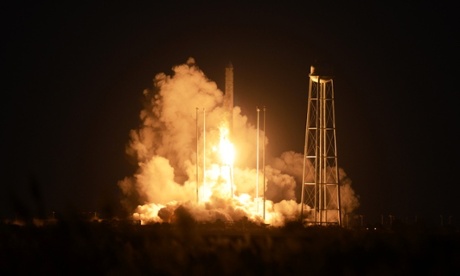Not Really!?!
"[Orbital] has a contract to resupply the International Space Station, and their rocket honestly sounds like the punchline to a joke."
"It uses Russian rocket engines that were made in the '60s. I don't mean their design is from the '60s, I mean they start with engines that were literally made in the '60s and, like, packed away in Siberia somewhere."
Elon Musk, chief executive, SpaceX
"We need to go through this investigation and be very thorough before we determine whether that's a factor [use of Soviet-era engines] in this or not."
"I do want to caution the public, this is an accident site and it's a rocket and it had a lot of hazardous materials on board that people should not be looking for or wanting to collect souvenirs over. If you find anything that washes ashore in the local area or came down in your farm or in your yard, please make sure that you call local authorities."
Frank Culbertson, vice-president, Orbital Sciences Corp.

"Due to certain specifics, it’s not possible to talk about the construction details of the rocket itself and the interaction of its systems during launch, since this is the field of American specialists. However, it's important to note that during yesterday’s launch, the AJ-26 first-stage engines, which are a modification of the NK-33, were functioning normally."
Kuznetsov company, Samara, Russia
Orbital executives with their contract to run cargo for NASA to the International Space Station were using 40-year-old Soviet-designed-and-manufactured rocket engines for which Orbital executives claim no modern alternatives to that technology exist. Now that's a wonder. Nothing equal to those particular engines exist? Then why not design and produce them? Isn't that their business after all? And if they have no other alternatives, what on Earth is SpaceX using as another NASA contractor?
In May, during tests at NASA's Stennis Space Centre in Mississippi, the very same type of AJ-26 engine, similar model to the two propelling the Antares rocket that exploded on Tuesday seconds after launch from Wallops Island Virginia, exploded. Mightn't that explosion have triggered a concern, enough so to point a stern figure of suspicion at the reliability and utility of those engines?
Thank heavens the rocket was unmanned; the resulting fireball and shredding of the rocket and its contents as a supply vessel carrying food, equipment and experiments for the astronauts on the ISS rained down potentially toxic material all over marshlands and farms in Virginia. That isn't manna from the heavens, that's possibly dangerous material to endanger whatever comes in contact with it, whether humans or wildlife, cattle or birds, let alone crops.

The contract privatization of space science may sound sensible to some degree, but not from the perspective of cost-saving, when low-end devices are used to produce high-end results. The AJ-26 engines bought and refurbished by a U.S. company, subsequently used in several rocket launches likely need to be permanently mothballed.
The $200-million Antares loss will be difficult to justify; saving funding by wasting funds doesn't appear like very good economics.
Labels: Exploration, Russia, Science, Space, Technology, United States

<< Home